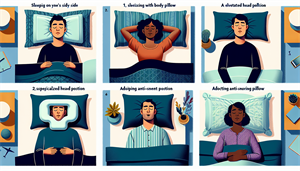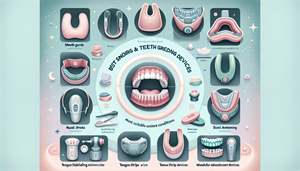
Best Sleeping Position to Stop Snoring
Ever been nudged awake by a disgruntled bed partner fed up with your nocturnal symphony? Or perhaps you’ve woken up feeling more drained than when you hit the sack?
Snoring, a common issue many brush off, can have significant implications not just on our well-being but also on our relationships. But fear not! Say goodbye to disturbed sleep and strained relationships by finding the best sleeping position to stop snoring.
Key Takeaways
-
Side-sleeping prevents the collapse of tissues in the upper airway, reducing snoring, and can be optimized with accessories like nasal strips and special pillows to improve health benefits beyond snoring reduction.
-
Back and stomach sleeping positions can negatively affect snoring; back sleeping may worsen it due to tissue collapse caused by gravity, while stomach sleeping may cause neck and back discomfort but could still mitigate snoring.
-
In addition to sleep position, lifestyle changes such as weight management, avoiding alcohol and sedatives before bedtime, and the use of supportive sleep accessories like the right pillow or adjustable beds, can significantly reduce snoring.
The Optimal Sleep Position to Halt Snoring
Did you know that your sleeping position significantly influences whether you snore or not? Adjustments to your sleep posture could lead to peaceful, snore-free nights and better overall sleep health. This article explores the effects of three main sleeping positions - side, back, and stomach - on snoring.
The Side-Sleeping Advantage
Imagine being told that a simple adjustment to your sleeping posture could dramatically reduce your snoring. That’s the power of side-sleeping!
This position works by preventing the collapse of tissues in the upper airway - a common occurrence when sleeping on the back - and maintaining an open airway. But how can you optimize the side-sleeping position to further alleviate snoring?
The trick lies in your sleeping accessories. Using tools like nasal strips that lift nasal passages, anti-snore pillows, and mouthpieces can dramatically improve airflow and reduce snoring.
But the benefits of side-sleeping stretch beyond snoring reduction. This sleep position can:
-
Improve spine alignment
-
Decrease the risk of sleep apnea
-
Enhance digestion
-
Help reduce wrinkles
-
Alleviate neck pain by maintaining proper spinal alignment
So, not only does side-sleeping help you breathe better, but it also contributes to your overall health and well-being.
The Perils of the Back Position
On the flip side, back sleeping, particularly in the Soldier position, can exacerbate snoring and sleep apnea symptoms. Why? The answer lies in gravity.
When you sleep on your back, gravity can cause the tissues around the air passage and your tongue to collapse, obstructing your airway and making it difficult to sleep without snoring.
This warning is particularly relevant for individuals who regularly snore or suffer from obstructive sleep apnea (OSA). Back sleeping can lead to louder snoring and worsening symptoms, so it’s best to avoid this position if you’re prone to these issues.
Stomach Slumber for Snore Reduction
For some, the answer to snoring lies on their stomach. Sleeping on your stomach can reduce snoring by preventing the base of the tongue and soft palate from collapsing and obstructing the airway.
However, while this position may help ensure a snore-free night, it’s not without its pitfalls. Stomach sleeping can cause discomfort in the neck and back and even lead to acid reflux.
To counter these problems, using a softer pillow can minimize sleep disruption from snoring. If you’re a stomach sleeper and your snoring persists, it may be indicative of an underlying sleep disorder, such as sleep apnea, and it’s advisable to seek medical consultation.
Supportive Accessories for Proper Sleep Posture
Though understanding your sleep position is important, it’s equally crucial to invest in supportive sleep accessories to enhance your sleep posture and reduce snoring.
Tools like nasal strips, anti-snore pillows, mouthpieces, and adjustable beds can significantly improve airflow and reduce snoring. Additionally, lifestyle changes such as weight management and avoiding alcohol and sedatives before bedtime can also contribute to snoring reduction.


